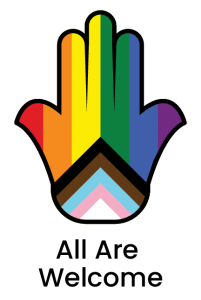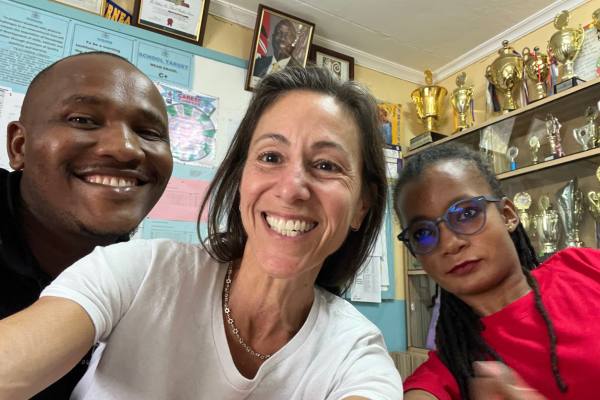
Next Step Foundation’s Upili Program Is Impacting Youths with Disabilities in Nairobi
Team Upili from left to right: Peter Simiyu, Carla Birnberg and Mariam Ndegwa at Joytown Special School in Thika, Kenya. Credit: Carla Birnberg
For the past four years, Chief Storyteller for the Next Step Foundation, based in Austin and Nairobi, Carla Birnberg‘s alarm has gone off at 3:55 a.m. The beeping is a reminder it is already 1 p.m. in East Africa. She climbs out of bed, grabs a strong cup of coffee and dives metaphorically into the Nairobi afternoon. She finds herself physically in Northwest Hills, while mentally living in her heart-home of Kenya.
“I first visited Kenya back in 1998. I loved my time there, including a visit to the synagogue in Nairobi. The only synagogue in all of East Africa, it was built in 1912. I was also fascinated by the fact Nairobi once had a Jewish Mayor, Israel Somen, who played a leading role in establishing relations between Kenya and Israel. I was intrigued by the small but powerful Jewish connection I felt. I enjoyed the trip. I never planned to return. As they say, ‘we make plans and G-d laughs’.”
Then, 22 years later Birnberg found herself boarding a plane to begin the long trek back to Nairobi, this time not for vacation but on a mission to create connection with her new team at Next Step, a foundation which focuses on economic inclusion through the creation of digital jobs for the historically excluded with a focus on Persons with Disabilities. Excited and curious to meet the team and to return to the place which tugged at her heart so long ago, Birnberg was not disappointed.
“When I turned my phone on after the last leg of my journey it buzzed with messages of karibu nyumbani Kenya—welcome home to Kenya—from my team. In the strangest of ways, it did feel like a homecoming. My Judaism has always been more about Tikkun Olam (repair the world) than traditional religious rituals. As I gathered my belongings to deplane I was surprised not to feel nervous about the extended visit only excited. I was reminded, again, of the notion: I do not help you because you are a Jew; I help you because I am a Jew. It was in that moment I discovered the why of my foundation work.”
The visit, a combination of office time and field work, revealed to Birnberg the clear similarities and vast differences between her home city and Nairobi. Using the latter as a homebase she spent time visiting rural Kenyan special secondary schools. In Kenya, Students with Disabilities are educated at “special schools” according to disability, e.g., schools for the Blind, schools for the Deaf, etc. It was during these visits an idea which became Next Step Foundation’s new program was born.
“As soon as I stepped outside my apartment into the Nairobi morning that first day I understood our tagline: Silicon Hills meets Silicon Savannah. There was very little difference between the energy of downtown Austin and our Nairobi offices and streets. It was there the similarity of my visit ended. As I traveled with Team member Mariam Ndegwa I was shocked both by what I learned and saw.”
Aware the schools she would visit would not be as well-equipped as those in the States, Birnberg was prepared to find that type of lack in the schools she visited. As a result, what surprised her was not missing material items, but the stories she heard and the gap in psychosocial support they highlighted. As the Team travelled back from visiting one school in particular, SA Joytown Secondary, an idea came to life. The time spent touring the school created connection not only because of the time spent with students, but many of the Next Step Foundation Team were graduates of the special school.
“As we walked around the grounds of Joytown I barely noticed the missing material goods. The missing perimeter wall, the wobbly, needing to be replaced desks. These physical items, while important were stuff, I knew other NGOs were committed to fulfilling. What struck me most throughout my conversations with students was the insufficient psychosocial support for them around their disabilities. During these discussions, I found myself leaning hard on my Master’s degree in counseling as I listened to their stories of trauma both past and present.”
The concept of Next Step Foundation’s Upili Program emerged during the long car ride from Thika, Kenya back to Nairobi and came fully to life in the weeks and months that followed. Beginning as an endeavor to offer 1:1 counseling sessions to students when Upili finally launched it offered more than ephemeral 50 minute sessions to the small number of students individual sessions could serve. Named after the Kiswahili word for secondary, the Upili Program’s theory of change grew to focus on supporting the mental health of Students with Disabilities in all facets of school life and development.
“Upon returning to Austin I immersed myself in research and learned Youth with Disabilities are 10 times more likely to suffer from depression. This number is increased in Kenya where stigmatization, marginalization and discrimination are still prevalent. The stories I heard from Joytown students and administration stuck with me and yet I realized the answer was not as simple as I’d initially surmised. While I longed to follow my parents’ path of tikkun olam and help repair this part of my world, the Upili program needed to be nuanced and layered to succeed.”
Back home in Silicon Hills, Birnberg both worked on creating a framework to support Kenyan Youth with Disabilities and immersed herself in the same in the Jewish world joining the Board of Matan, a non-profit which guides, trains, and supports Jewish communities in providing inclusive opportunities for Youth with Disabilities and their families. Working to launch one and collaborating to maintain momentum with the other was the catalyst she needed to make both roles successful.
“We have now completed the pilot of the Upili program and could not be prouder of what we created and of the results. The program, Counselors with Disabilities offering group therapy to Students with Disabilities, has proven to be more impactful in our 10 week launch than we could have imagined. Introducing the school community to a successful certified counselor who also has endured the stigma of having a disability has shown both students and parents what is possible.”
While it is an audacious goal to endeavor to shift the perceptions around disabilities in Kenya, Carla and Team Upili plan to do this one special school at a time. With a theory of change that includes meeting psychosocial needs of students, training teachers and staff to serve as “psychological first responders,” and offering support to parents and caregivers the Upili Program will instill self-confidence, improve academic performance, and provide tools to successfully navigate future discrimination so that Youth with Disabilities can achieve economic independence at an equal rate as their non-disabled Kenyan peers.
“I’m recently back from spending a month in Kenya working in the schools and with the Team to ensure Upili was ready for launch. On the day I departed Mariam, who is everything Team Upili when I’m in the USA, gave me a gift of a mug. On one side was the word NURU, the Kiswahili word for light and the name the Team has given me. One the other was pictured a globe with a heart in the center and the words Tikkun Olam underneath. As a human and as a Jew I could not have felt more touched, seen, or understood.”
May was Mental Health Awareness month, and research showed that students who went through the Upili pilot program were nearly twice as likely to report reduced daily and weekly levels of anxiety and 2.5 times more likely to report reduced daily and weekly levels of depression as students who did not receive the intervention.
To view the Upili Pilot Impact Report, click here.
Latest Posts

AJA Hosts Parent Education Event
In early November, Austin Jewish Academy hosted a parent education event facilitated by Hagit Segal, co-owner of Mistake & Friends, to help parents foster positive child development. Segal shared valuable insights on cultivating a growth mindset, emphasizing the...
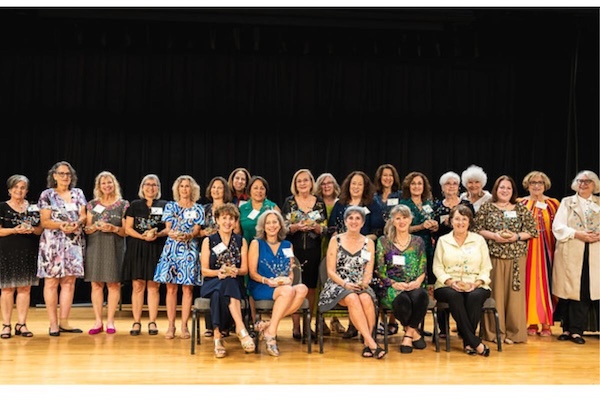
National Council of Jewish Women Starts the Year With a Double Chai Celebration and Continues With Activities Through the Fall and Spring
Past Presidents in attendance at the NCJW Double Chai Celebration: Seated L to R: Bettie Forman, Eileen Ladd, Karen Siegel, Melanie Cox and Barbara Laudenheimer. Standing L to R: Merle Dover, Ann Kocher, Joan Brook, Ellen Sable, Nanci Kahn, Amy Webberman,...
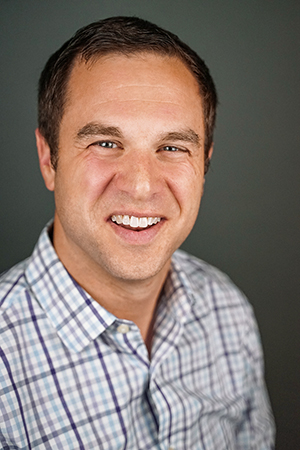
Praying for a Peaceful New Year
Since I will be on sabbatical, I am writing this column in June shortly before my leave begins. Summer camp is well underway at Shalom Austin and both of our Texas overnight camps, Camp Young Judaea Texas and URJ Greene Family Camp, began their first session only a...
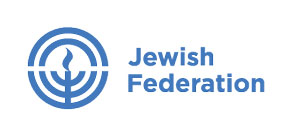
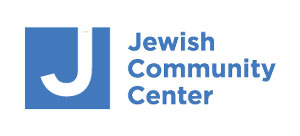
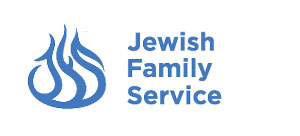
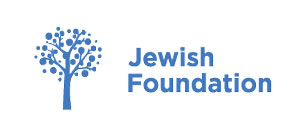
HEALTH & WELLNESS
Fitness
Swimming
Tennis & Pickleball
Sports
EDUCATION
Jewish Culture & Education
Early Childhood Program Preschool
After School & Childcare
Camps
ARTS & CULTURE
Literary Arts
Visual Arts
Theatre & Film
Dance
COUNSELING & SUPPORT
Jewish Family Service
Counseling & Groups
Case Management
References & Resources
Copyright Shalom Austin 2025. Privacy Policy.
